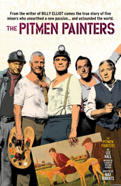From Billy Elliot to The Pitmen Painters, Tony Winner Lee Hall Celebrates the Power of Art
About the author:
By any measure, the film and stage versions of Billy Elliot presented a hard act to follow for Lee Hall. The delightful 1999 feature film about the son of a miner who dreams of pursuing his love of dance netted the Newcastle native an Oscar nomination for Best Original Screenplay. Less than a decade later, Hall’s Broadway musical adaptation (featuring a score by Elton John) won him a Best Book Tony Award. Hall has continued to write for the theater, TV and film (including the forthcoming Steven Spielberg epic War Horse), but it’s another story from his Northern England roots that has brought him back to Broadway: The Pitmen Painters. The play centers on a group of 1930s-era miners who become celebrated artists, finding inspiration from a local art appreciation class. From opening night in 2007 at a small theater in Newcastle to Manhattan Theatre Club’s Samuel J. Friedman Theatre in 2010, the play has held on to its original cast, all of whom are making their Broadway debuts. Hall charted the history of his acclaimed drama (which also happens to be very funny) for Broadway.com.
![]()
The most extraordinary thing about The Pitmen Painters is that it is all true. In 1934, in the middle of the Depression, a group of uneducated, working miners—most of whom had left school at the age of 11—hired the professor of a local university in Northern England to teach them Art History. Having never seen a painting before, the group found it impossible to learn Art History and went on a voyage of discovery about the philosophy of art by doing it themselves.
The professor basically invented modern art teaching as he went along, but more extraordinarily, the men proved to be significant artists and, within a year, were collected by the most significant British collectors and exhibited around the country. They became celebrated by the Liberal intelligentsia of the time, befriended the most famous and most avant-garde artists of their time, were featured in the most august journals, lectured on the BBC—yet every day, they worked 10 hours underground in a coal mine in some of the worst conditions in Europe. Not only that, but the group did so for 50 years.
By 2006, however, their story had fallen into obscurity. Their paintings were in storage, and I would have remained completely ignorant if I'd not discovered a secondhand book about them purely by accident. Having written Billy Elliot 10 years before, I was drawn to the title of the book—The Pitmen Painters—but the last thing I wanted to do was to write another piece about mining and art. However, by the time I'd read the first chapter in the taxi home, I knew I had to write a play about these extraordinary men.
The life of the play has been an extraordinary journey in itself. I initially wrote it for Live Theatre in Newcastle Upon Tyne. I'd grown up watching plays in its 100-seat warehouse theater, and it was undergoing building work to expand it to a massive 200 seats. Given Newcastle's history in the coal trade, the Pitmen seemed the perfect subject to re-open the theater. The company is largely made up of a group of actors who all grew up together. The opportunities to make theater in the North East are very limited, so anyone with cultural aspirations seems to end up there. I've known the director and most of the cast since I was 16, so this was a very personal project. Everybody in the company has some family connection to mining—as do most people in the North East—so the realities of our own journey seemed to echo the themes of the play.
Our first run was a sellout. The artistic director of the National Theatre, Sir Nicholas Hytner, came to see it and immediately brought it to London. The buzz about the production sold out the run before we opened, so we were immediately asked to come back to the bigger auditorium at the National. The play was showered with awards and critical praise and sold out its run at the bigger theater, and over the last three years, we've kept coming back. In between our sold-out runs in London we've toured the show across the country. Several foreign companies have made their own versions, from Austria to Korea. But it is the original version we are bringing to the Manhattan Theatre Club’s Samuel J. Friedman Theatre on Broadway.
Every member of the original cast is still with the show in the same roles that were written specifically for them. From a writer’s point of view, it is a dream job. A company who have a shared history that goes back 25 years is rare enough, but to create parts for actors of such talent and to be able to develop the play over such a long run happens very rarely indeed.
Personally speaking, to have two plays on Broadway is quite a thrill for an English boy from an ex-mining town—and the fact that we're just a block away from Billy Elliot is amazing to me. But The Pitmen Painters has much in common with the musical— in a way it's a Prequel—and although it doesn't have dancing teenagers, it shares the same sense of humor and passion and celebrates the extraordinary potential of ordinary folk in a way that I think chimes with the best of American culture and political aspiration. For that reason, it is a real privilege to be here and to share our extraordinary story with a whole new audience.
